新概念2 Lesson 21 Mad or not知识清单
- 格式:pdf
- 大小:360.85 KB
- 文档页数:7

Lesson 21 Mad or notStep 1 Key words and expressions1.mad adj. 发疯sb is mad.mad 常用于“为...而疯狂” (着迷)① be mad aboutI'm mad about English.② be crazy about③ go insane (insane adj.患精神病的, 精神病患者的, 极愚蠢的)go+adj.变得...They are going bananas. =go crazy=go mad (变疯了)与“go” 相连2.drive vi.开车vt.驾驶;驱赶;推动n. 驱动器3.reason n. 原因for this reason 由于这个理由、原因as+句子because+句子4.sum n.量a sum of一笔(后接不可数名词)a large sum of大量的(large 指数量的大)a great number of + 可数名词复数a great many + 可数名词复数a large quantity of +不可数名词/可数名词复数,此时谓语动词取决于of后的名词5.determined adj. 坚定的, 下决心的be determined to do sth.下定决心做某事determine v.下定决心相当于make up one's mind to do/ decide to do sth/ make a decision to do sth.Step 2 Grammar pointI.被动语态的回顾被动语态的构成:be+动词的过去分词+by sb(be+done)一般现在时:am/is/are+taught一般过去时:was/were+taught一般将来时:will/shall be+taught现在进行时:am/is/are being+taught过去进行时:was/were + being + taught将来进行时:will + be + being + done现在完成时:have/has been+taught过去完成时:had been + taught将来完成时:will have + been+ taught含有情态动词的被动语态:can/may/must/should... +be done情态动词对过去的推测:can/may/must/should + have been + done练习I.选择1.---Do you know when we________?---I'm not sure. I will tell you about it when the time________.A. leave;is fixedB. will leave;is fixedC. leave;will be fixedD. will leave;will be fixed.2. Alice some advice on how to improve her listening skills, and she gladly accepted Miss Green' s.A. gaveB. was givenC. givesD. is given3. Last March, many trees ________ along the streets to make our city more beautiful.A.were plantedB. were plantingC. had plantedD. planted4.--- Clark, your room is really in a mess. It needs ________.--- Sorry, mum. I'll do it at once.A.cleanB. cleanedC. to cleanD. to be cleaned5.In the past few years, great changes______in Lianyungang.A.take placeB. took placeC. have taken placeD. have been taken place6.It's reported that a new Railway Station _______ at the end of this month.A.has been completedB.is completedC.was completedD.will be completed7. We're sure that the environment in our city ______ greatly through our work in the near future.A. improvedB. was improvedC. has improvedD. will be improved8. ---Hobo,can I eat the hamburger?---Sure,if the dishes .A.washB.are washedC.will washD.will be washed9.Moon cakes for free to those old people this coming Moon Festival.A.were offeredB.will offerC.have offeredD.will be offered10.The film made by Walt Disney________all over the world.A.is used to showB. is used to showingC. used to showD. used to be shown11.---Have you finished your fashion design?---Not yet. I'll finish it if I ________ ten more minutes.A.am givenB. giveC. will giveD. will be given12.---“Frog”, Mo Yan's latest novel, please!--- Sorry, it ______ just now. But it will come out again soon.A.sold outB. is sold outC. has sold outD. was sold out13.The room _______ every day. You can live it now.A.cleansB. is cleaningC. is cleanedD. has cleaned14.--- How soon ______ all the work ______? --- In a week.A. will…finishB. is...going to finishC. will…be finishedD. are…going to be finishe d15. In the past few years, thousands of films all over the world.A. have producedB. have been producedC. are producingD. are being produced16. Many children in Britain _______ to have their own bank cards these days.A. allowB. allowedC. are allowedD. were allowed17. In Switzerland , things like glass and plastic ______ into different groups and then recycled .A. separateB. separatedC. are separatedD. is separated18. --- How is your pet dog?--- He is lovely. But if he ______ at home all day, he ______ at me angrily.A. keeps; barksB. is kept; will barkC. is kept: barkD. keeps; will bark19. ---Don't forget to come to our school assembly(集会)tomorrow morning.---I won't. I just now.A. remindedB. was remindedC. reportedD. was reported20. Last year, five Chinese teachers to a school in the UK to teach the British students in Chinese style for four weeks.A. was sentB. were sentC. have sentD. sentStep 3 ExerciseIt was very cold that day. It was __1__ heavily and the ground was covered with __2__ snow. The shepherd thought it was dangerous to __3__ the hill and it was difficult for the sheep to find some __4__ there. So he decided to stay in the __5__ room. He put some hay(干草) in a pen(围栏) __6__ the sheep could eat it when they were __7__. The dog, who felt cold outside, lay on the __8__ hay and soon went to sleep.At noon the sheep wanted to eat the hay. They were __9__ afraid of the dog and __10__ could get close to it. At lastthe __11__ sheep came to the hay. Before he started to eat, the dog heard it and opened his eyes. He barked(吠) loudly to __12__ him. The sheep ran away __13__. Looking at the unnatural(不近人情的) dog, the sheep began to talk __14__.“What a selfish(自私的) dog!” said one of the sheep. “H e cannot eat the hay, and yet refuses to __15__ those who can to eat!”1. A. raining B. snowing C. blowing D. shining2. A. thick B. thin C. beautiful D. big3. A. play on B. live on C. climb up D. go to4. A. cake B. grass C. fruit D. vegetables5. A. cold B. cool C. hot D. warm6. A. in order to B. so as to C. so that D. in order7. A. hungry B. sick C. full D. free8. A. hard B. soft C. thin D. wet9. A. both B. either C. all D. neither10. A. none B. neither C. any D. some11. A. smallest B. youngest C. weakest D. strongest12. A. meet B. greet C. warn D. receive13. A. easily B. happily C. sadly D. quickly14. A. angrily B. happily C. quietly D. politely15. A. let B. ask C. forget D. allow。

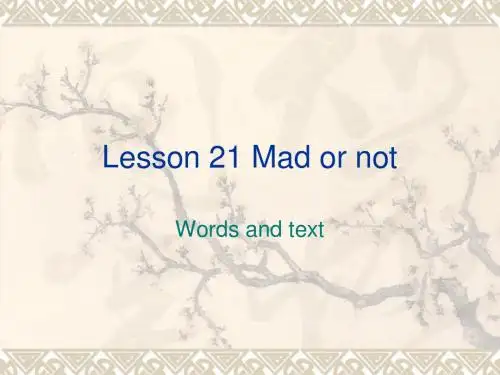
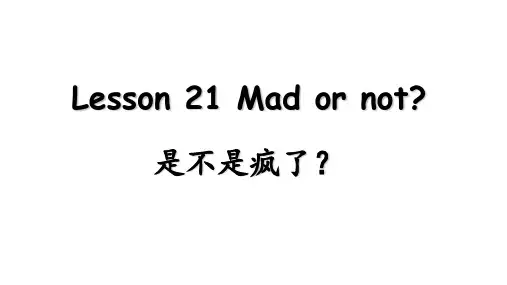
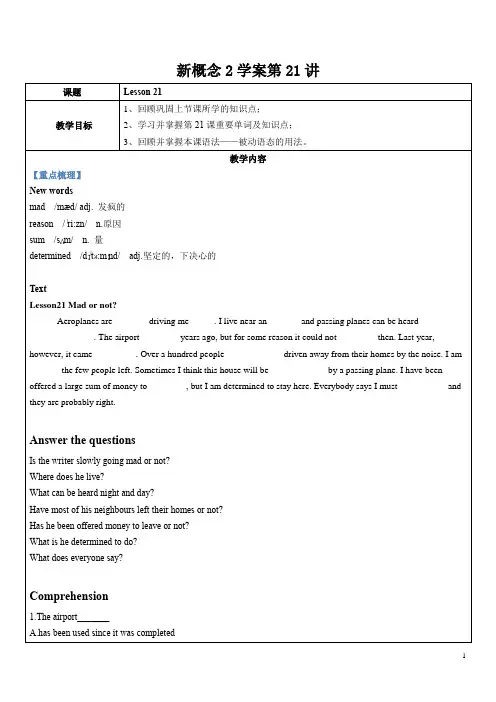
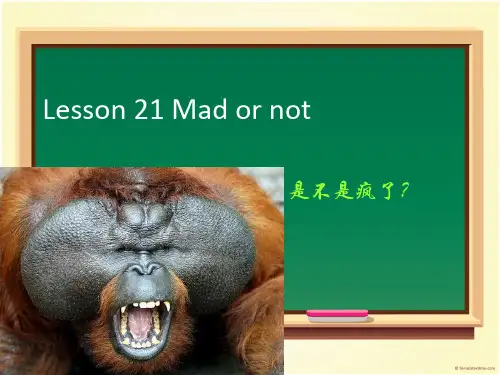
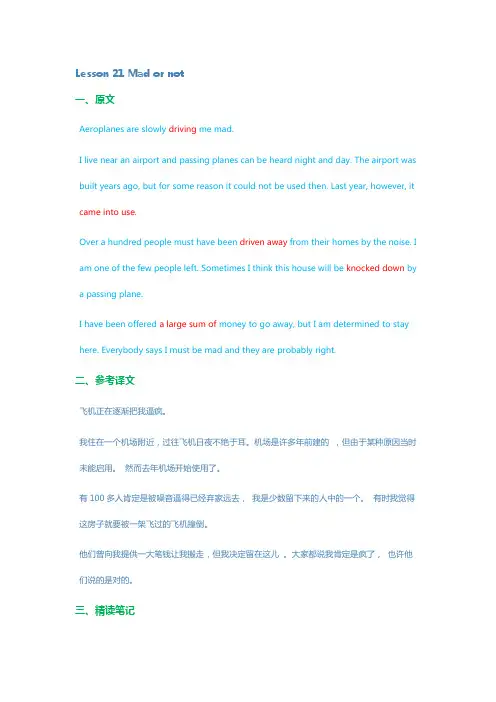
Lesson 21 Mad or not一、原文Aeroplanes are slowly driving me mad.I live near an airport and passing planes can be heard night and day. The airport was built years ago, but for some reason it could not be used then. Last year, however, it came into use.Over a hundred people must have been driven away from their homes by the noise. I am one of the few people left. Sometimes I think this house will be knocked down by a passing plane.I have been offered a large sum of money to go away, but I am determined to stay here. Everybody says I must be mad and they are probably right.二、参考译文飞机正在逐渐把我逼疯。
我住在一个机场附近,过往飞机日夜不绝于耳。
机场是许多年前建的,但由于某种原因当时未能启用。
然而去年机场开始使用了。
有100多人肯定是被噪音逼得已经弃家远去,我是少数留下来的人中的一个。
有时我觉得这房子就要被一架飞过的飞机撞倒。
他们曾向我提供一大笔钱让我搬走,但我决定留在这儿。
大家都说我肯定是疯了,也许他们说的是对的。
三、精读笔记Part 1 词汇、短语1、drive(1)VEHICLE 交通工具to operate a vehicle so that it goes in a particular direction驾驶;开车I drove to work this morning. 我今天早上开车去上的班。
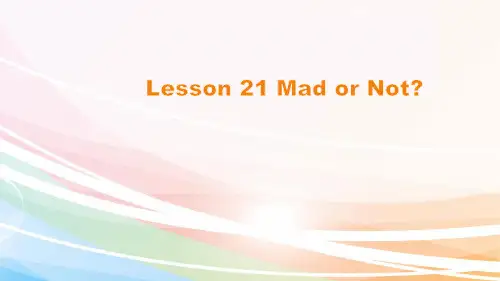
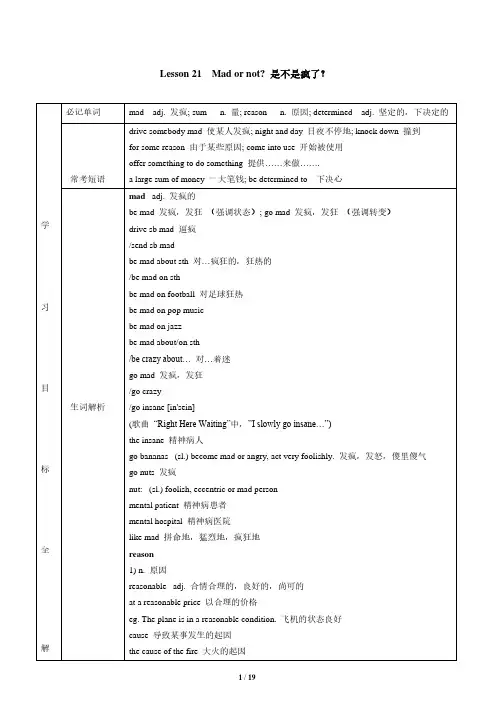
Lesson 21 Mad or not? 是不是疯了?学习目标全解必记单词mad adj. 发疯; sum n. 量; reason n. 原因; determined adj. 坚定的,下决定的常考短语drive somebody mad 使某人发疯; night and day 日夜不停地; knock down 撞到for some reason 由于某些原因; come into use 开始被使用offer something to do something 提供……来做…….a large sum of money 一大笔钱; be determined to 下决心生词解析mad adj. 发疯的be mad 发疯,发狂(强调状态); go mad 发疯,发狂(强调转变)drive sb mad 逼疯/send sb madbe mad about sth 对…疯狂的,狂热的/be mad on sthbe mad on football 对足球狂热be mad on pop musicbe mad on jazzbe mad about/on sth/be crazy about… 对…着迷go mad 发疯,发狂/go crazy/go insane [in'sein](歌曲“Right Here Waiting”中,”I slowly go insane…”)the insane 精神病人go bananas (sl.) become mad or angry, act very foolishly. 发疯,发怒,傻里傻气go nuts 发疯nut: (sl.) foolish, eccentric or mad personmental patient 精神病患者mental hospital 精神病医院like mad 拼命地,猛烈地,疯狂地reason1) n. 原因reasonable adj. 合情合理的,良好的,尚可的at a reasonable price 以合理的价格eg. The plane is in a reasonable condition. 飞机的状态良好cause 导致某事发生的起因the cause of the fire 大火的起因生词解析eg. Smoking is one of the causes of lung cancer. 吸烟是肺癌的起因之一。
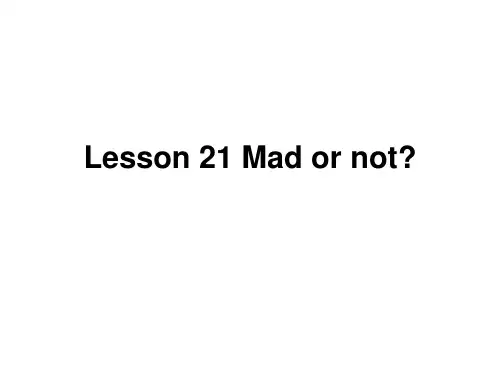
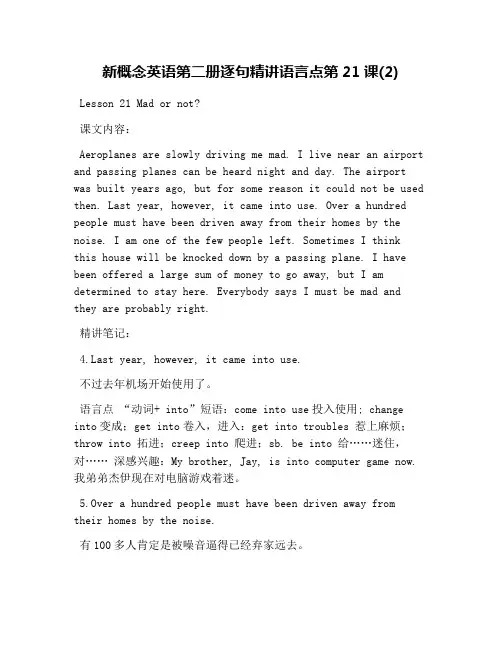
新概念英语第二册逐句精讲语言点第21课(2)Lesson 21 Mad or not?课文内容:Aeroplanes are slowly driving me mad. I live near an airport and passing planes can be heard night and day. The airport was built years ago, but for some reason it could not be used then. Last year, however, it came into use. Over a hundred people must have been driven away from their homes by the noise. I am one of the few people left. Sometimes I thinkthis house will be knocked down by a passing plane. I have been offered a large sum of money to go away, but I am determined to stay here. Everybody says I must be mad and they are probably right.精讲笔记:st year, however, it came into use.不过去年机场开始使用了。
语言点“动词+ into”短语:come into use投入使用; change into变成;get into卷入,进入:get into troubles 惹上麻烦;throw into 拓进;creep into 爬进;sb. be into 给……迷住,对…… 深感兴趣:My brother, Jay, is into computer game now. 我弟弟杰伊现在对电脑游戏着迷。
新概念英语第二册课文详解:Lesson21 Mad or not 【新概念英语第二册课文Lesson21生词和短语】sb is mad.mad 为...而疯狂be mad aboutI'm mad about English.crazy 为……而疯狂的be crazy aboutgo insanceI slowly go insance.go+adj. 变得...They are going bananas. =go crazy=go mad★reason n. 原因as+句子because+句子for this reason 因为这个理由、原因For this reason,I was late.★sum n. 量a great many + 可数名词复数a large ...a great number of + 可数名词复数plenty of 充足的a sum of 一笔a large sum of 大量的a large sum of money★dete rmined adj. 坚定的,下决心的determine v.下定决心make up one's minddecide to do sth.make a decision:decisionmake a decision to do sth.be determined to do sth.下定决心做某事Aeroplanes are slowly driving me mad. I live near an airport and passing planes can be heard night and day. The airport was built years ago, but for some reason it could not be used then. Last year, however, it came into use. Over a hundred people must have been driven away from their homes by the noise. I am one of the few people left. (暂不提供全部内容)【新概念英语第二册课文详解Lesson21】Mad or not? = mad or not mad(省略)?or not 在疑问词的后面,表示是还不是,选择概念Why do people think the writer is mad?drive sb. mad 逼某人发疯drive v. 驾驶,开车You are driving me mad.The teacher is slowly driving me mad.night and day 日日夜夜passing planes 过往飞机;pass v.passing 作定语;正在经过的sleeping baby 正在睡觉的小孩waiting car 正在等待的车be builtyears ago = many years agofor some reason 因为某个理由some + 可数名词单数;some 表示某一个some+不可数名词单数:一些 some watersome+可数名词复数:一些 some bookssome+可数名词单数:某一 some bookhowever 用于句首,句中,用逗号隔开come into use : into prep.; use n.投入使用;主动概念,没有被动式be used 被动表示被使用over a hundred ...must have done 过去发生,推测must have been done 被动。
Exercise for Lesson 21Mad or not?A. 用被动语态改写下列句子。
e.g.The students keep their belongings in the cupboard under their beds.The student s’ belongings are kept in the cupboard under their beds.Exercise1. The president of the university welcomed the new students and their parents in a short opening speech. ______________________________________________________________________________________2. The department holds meetings every Tuesday afternoon.______________________________________________________________________________________ 3. The mechanic(技工)has replaced(替换)the flat tyre(轮胎).______________________________________________________________________________________ 4. They will give her a driving licence after a month’s training.______________________________________________________________________________________ 5. They had checked all the windows in the house.______________________________________________________________________________________ 6. The shop keeper closed the door after I went into it.______________________________________________________________________________________ 7. They may ask you a lot of personal questions.______________________________________________________________________________________ 8. The boss will probably give you some difficult jobs on your first day.______________________________________________________________________________________ 9. They will most likely to require you to do a written test.______________________________________________________________________________________ 10. Someone has stolen the luggage I bought last week.______________________________________________________________________________________B.根据括号内提供的信息,用被动语态回答下列问题。
Lesson 21 Mad or not? 是不是疯了展开全文1. Aeroplanes are slowly driving me mad.飞机正在逐渐把我逼疯。
drive→drove→driven(动词:驾驶;驱赶/驱使;逼迫). 【比较】drive in是“乘车”。
①He drives his car very(bad). 他开车技术非常糟糕。
②The farmer(drive) the cattle in the fieldjust now. 那位农夫刚才把牛赶进田里。
③During the war, many people(drive) out of their homes.战争期间,许多人被赶出家园。
driveme mad:drive+宾语+宾补(形容词/不定式/介词短语等)④Hunger drove them (sell) their children. 饥饿迫使他们卖儿卖女。
drive(名词:驾驶;车程;开车旅行)⑤两小时的车程:;⑥驾车载某人出游:。
2. I live near an airport and passing planes can be heardnight and day. (...过往飞机日夜不绝于耳。
)一、passing planes 中的passing是,用作。
现在分词是非谓语动词的一种,具有双重性,一方面具有动词的特征,可以有自己的宾语和状语;另一方面具有形容词和副词的特征,可以充当表语,定语,状语,补足语,可以表示主动或正在进行的动作。
现在分词作定语,表示正在进行的或主动的动作。
也可以说明被修饰词的性质和特征,此时可换成相应的定语从句。
例如:①There was a terrible noise following the sudden burst of light.= There was a terrible noisethat/ which is following the sudden burst of light.②He saw a flying bird.= He saw a bird that/ which is flying.③I was satisfied with the exciting speech.= I was satisfied with the speechthat/which is exciting .二、“be+(及物动词的)过去分词”构成被动语态。
Lesson 21 Mad or not?Aeroplanes are slowly driving me mad. I live near an airport and passing planes can be heard night and day. The airport was built years ago, but for some reason it could not be used then. Last year, however, it came into use. Over a hundred people must have been driven away from their homes by the noise. I am one of the few people left. Sometimes I think this house will be knocked down by a passing plane. I have been offered a large sum of money to go away, but I am determined to stay here. Everybody says I must be mad and they are probably right.是不是疯了飞机正在逐渐把我逼疯。
我住在一个机场附近,过往飞机日夜不绝于耳。
机场是许多年前建的,但由于某种原因当时未能启用。
然而去年机场开始使用了。
有一百多人肯定是被噪音逼得离家远去。
我是少数留下来的人中的一个。
有时我觉得这房子就要被一架飞过的飞机撞倒。
有人曾向我提供一大笔钱让我搬走,但我决定留在这儿。
大家都说我肯定是疯了,也许他们说的是对的。
知识要点1、mad [mæd]n. 狂怒;adj. 疯狂的;发疯的;愚蠢的;着迷的;狂热的;热爱的;巧搭:drive sb. mad让某人发疯mad as a hatter(形容某人)疯了 a mad old man一个疯老头a mad bull一头疯牛go mad发疯be mad about(for/on)…对…着迷(魔/疯狂)=be crazy aboutbe mad about beauties对美女着魔be mad about English对英语着魔be mad at sb.(sth.)对某人(某事)恼火as mad as a March hare(形容某人)疯了辨析:mad疯的(可以是疯狂的,也可以是疯了的);crazy疯狂的,狂热的(只是一种状态,肯定没病) insane患精神病的,例an insane asylum疯人院拓展:madness n.疯狂,发疯例句:They are going bananas.=go crazy=go mad=go insane(变疯了) g o+adj.结构,表示“变得…”例句:Mad Cow Disease appeared again in the Us last month. 上个月在美国又出现了疯牛病。
2、reason ['riːz(ə)n]n. 原因;理性;动机;vt. 说服;推论;辩论;vi. 推论;劝说巧搭:for some reason由于某种原因by reason of由于… the reason for…is that… …的原因是…the reason for …的原因(the reason for his death他死亡的原因) reason out of力劝,说服the reason why sb. does sth. is that…某人为什么做某事的原因是… reason out分析,推断beyond/out of all reason毫无道理拓展:reasoned adj.符合逻辑的reasonably adv.合理地,相当地reasoning n.推理reasonable adj.合情合理的,适度的例句:The reason for my quitting is that I don’t like our boss. 我辞职的原因是我不喜欢我们的老板。
例句:The reason why I quit my job is that I don’t like our boss. 我为什么辞职的原因是我不喜欢我们的老板。
例句:For some well known reason, the US hung Saddam.鉴于某种众人皆知的原因,美国绞死了萨达姆。
例句:Only man has reason---animals do not. 只有人有理性,兽类则无。
3、sum [sʌm]n. 量;金额;总数;算术;vt. 总结;合计;vi. 概括巧搭:sum up总结,概括in sum总而言之 a large sum of money一大笔钱(a sum o f+不可数) 拓展:summing adj.求和的plenty of…足够多的… an amount of+不可数(一大笔)辨析:sum指几个简单数的加和;amount n.总数,总量,数额(可数),与sum相近,但指分项开支的累加数,有时指一笔钱;total n.总数,合计(可数),指各项累加数之和;例句:The operation costs an enormous sum. 这个手术要花费一大笔钱。
例句:The judge summed up the evidence presented. 法官概括了所提出的证据。
例句:The sum of 6 and 5 is 11. 6加5等于11。
4、determined [dɪ'tɜːmɪnd]adj. 下决心的;坚定的;巧搭:be determined to do sth.下决心做某事=make up one’s mind to do sth.拓展:decide to do sth.决定做=make a decision to do sth.例句:I am determined to go at once. 我决意立刻就去。
5、determine [dɪ'tɜːmɪn]v. (使)下决心,(使)做出决定;查明拓展:determinant adj.决定的determination n.决心;决定indeterminate adj.不确定的例句:I determined to go home this weekend. 我准备这周回家。
6、probably ['prɒbəblɪ]adv. 大概;或许;很可能例句:I’ll probably see you tomorrow. 我可能明天来看你。
例句:He will probably refuse the offer. 他很可能会拒绝这个建议。
7、drive [draɪv]n. 驱动器;驾车;v. 开车;迫使,逼迫;驾驶巧搭:drive…home开车(送…)回家,使被充分了解drive into action使采取行动,开动drive off赶走drive out赶出去drive sb. mad(crazy)使人发疯drive sb. to despair使陷入绝望drive sb. to do迫使…做full of drive干劲十足drive to…开车去某地drive sb. away from把某人赶走drive sb. back撵回去例句:The rising hurricane drove the rain in sheets. 越来越大的飓风刮得雨瓢泼而下。
8、passing ['pɑːsɪŋ]adj. 经过的;越过的在文中是动词分词作形容词使用。
拓展:a smiling cop一个面带微笑的警察 a hair-raising trip一次惊心动魄的旅行例句:I saw him passing just now. 刚才我看见他走过去了。
例句:He forgot the man with passing time. 随着时间的消逝,他忘掉了那个人。
9、build [bɪld]vt. 建立,建筑,建造巧搭:build castles in air空中楼阁build on以…为基础,指靠… build up建立起来,积累辨析:build, construct, foundbuild既指具体有形的物体建造,也指抽象事物的建造;construct着重指根据一定的且比较复杂的计划或设计来构造;found着重指打下的基础,尤指基金创立事业、单位学校等,也用于党派、国家等的创立,可与具体和抽象名词连用。
例句:They built him a house. 他们给他盖了一所房子。
10、noise [nɒɪz]n. [环境] 噪音;响声;杂音巧搭:make a noise吵闹,发出嘈杂的声音noise pollution噪音污染 a big noise(含贬义)要人,名人辨析:sound, voice, noise, accentsound泛指耳朵听到的声音;voice一般指说话、笑、歌声,也指鸟等动物声;noise不悦耳的声音;accent口音例句:The Concorde’s noise level is high. 协和式飞机的噪音级很高。
11、offer ['ɒfə]vt. 提供(相当于given)巧搭:offer to do提出要做… offer sb. sth.(offer sth. to sb.)拿给某人某物12、本课词组night and day日日夜夜反用,表示强调晚上。
类似的:here and there到处more or less无论如何sooner or later迟早come into use开始被使用(主动概念,没有被动式)例句:When did the train come into use?例句:No one knows when the new Labor Law can come into effect. 没人知道新的劳工法何时生效。
knock down撞到,击倒例句:He was knocked down by a truck. 他被卡车撞到了。
away from从某地离开(out of somewhere从某地出来)13、本科语法㈠关于few和little与only或very的搭配我们只能说only a few, only a little,而不能说:only few, only little但为了强调否定意义,我们可以说very few, very little㈡数的表示法①基数词1-12的表示比较特殊,需要死记,13-19都是以teen结尾,20-90的整十位都以ty结尾。